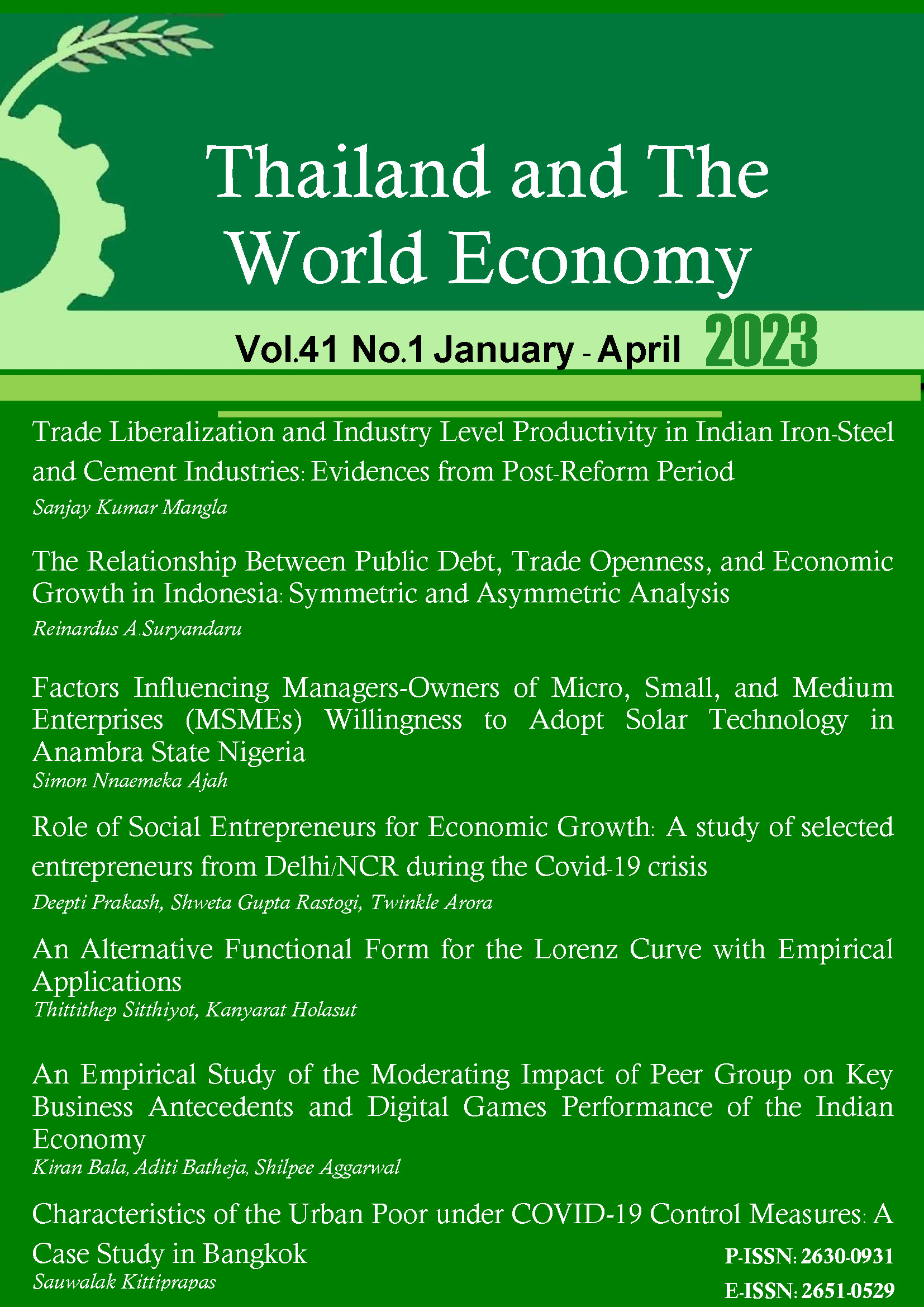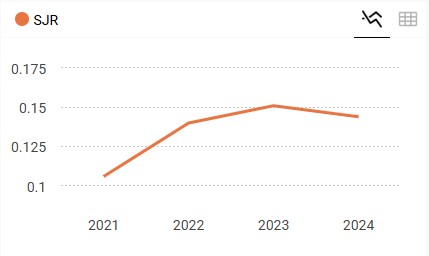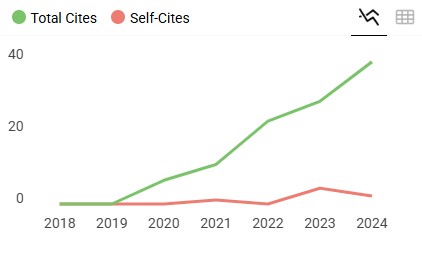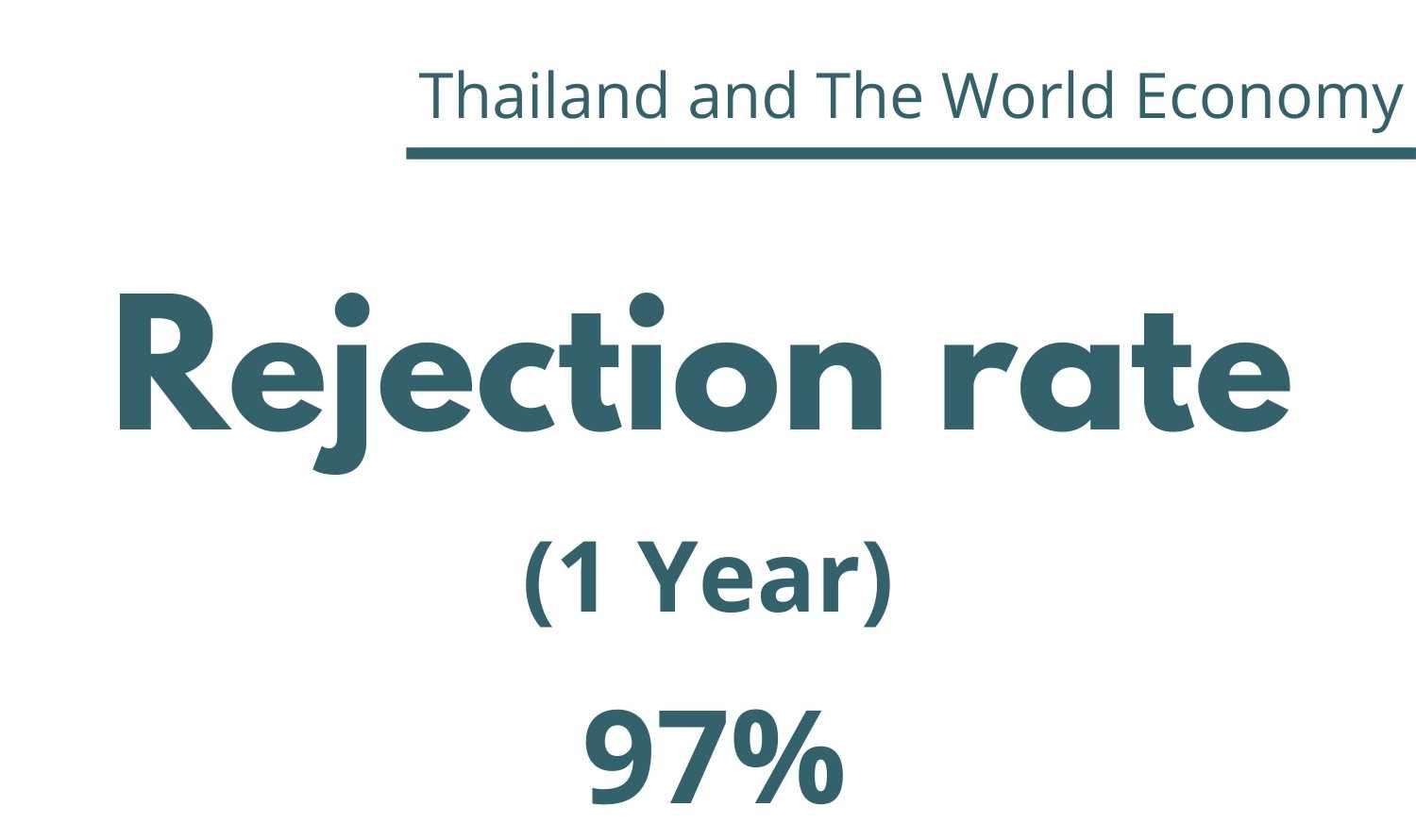Role of Social Entrepreneurs for Economic Growth: A study of selected entrepreneurs from Delhi/NCR during the Covid-19 crisis
Keywords:
Covid-19 crisis, Crisis management, social entrepreneurship, social value creation, Economic growthAbstract
The Covid-19 crisis has impacted the world economy in an unprecedented way. The spread and consequences of the deadly virus have disrupted business and human lives globally. The purpose of the paper is to study the role and contributions of social entrepreneurs in the management of Covid-19 crisis to provide innovative solutions and contribute to economic growth for the betterment of society. For this purpose, in-depth semi-structured interviews were conducted with social entrepreneurs actively working during the Covid-19 crisis in Delhi/NCR. Thematic analysis was used to report the findings of the study. The study reveals the motivation factors that influence and push social entrepreneurs to work for people, especially in times of crisis. It also demonstrates the challenges and opportunities faced by social entrepreneurs to manage the crisis and create better social well-being. The paper reflects the understanding of social entrepreneurs’ role during pandemic times and thereby provides ways for managing the crisis to accelerate economic growth.
References
Alon, I., Farrell, M., & Li, S. (2020). Regime type and COVID-19 response. FIIB Business Review, 9(3), 152–160.
Alvord, S. H., Brown, L. D., & Letts, C. W. (2004). Social entrepreneurship and societal transformation. The Journal of Applied Behavioral Science, 40(3), 260–282.
André, K., &Pache, A. C. (2014). From caring entrepreneur to caring enterprise: Addressing the ethical challenges of scaling up social enterprises. Journal of Business Ethics, 133(4), 659–675.
Anggadwita, G., Luturlean, B. S., Ramadani, V., &Ratten, V. (2017). Socio-cultural environments and emerging economy entrepreneurship: Women entrepreneurs in Indonesia. Journal of Entrepreneurship in Emerging Economies, 9(1), 85–96.
Arena, M., Azzone, G., &Bengo, I. (2015). Performance measurement for social enterprises. VOLUNTAS: International Journal of Voluntary and Nonprofit Organizations, 26(2), 649–672.
Bacq, S., & Alt, E. (2018). Feeling capable and valued: A prosocial perspective on the link between empathy and social entrepreneurial intentions. Journal of Business Venturing, 33(3), 333–350.
Bacq, S., Geoghegan, W., Josefy, M., Stevenson, R., & Williams, T. A. (2020). The COVID-19 virtual idea blitz: Marshaling social entrepreneurship to rapidly respond to urgent grand challenges. Business Horizons, 63(6), 705-723.
Bacq, S., Hartog, C., &Hoogendoorn, B. (2016). Beyond the moral portrayal of social entrepreneurs: An empirical approach to who they are and what drives them. Journal of Business Ethics, 133(4), 703–718.
Barba-Sánchez, V., & Atienza-Sahuquillo, C. (2018). Entrepreneurial intention among engineering students: The role of entrepreneurship education. European Research on Management and Business Economics, 24(1), 53–61.
Bornstein, D. (2007). How to change the world: Social entrepreneurs and the power of new ideas. Oxford University Press,Penguin Books, London ,United Kingdom.
Brandsen, T., &Karré, P. M. (2011). Hybrid organizations: No cause for concern?.International Journal of Public Administration, 34(13), 827–836.
Braun, V., & Clarke, V. (2006). Using thematic analysis in psychology. Qualitative Research in Psychology, 3(2), 77–101.
Brickson, S. L. (2007). Organizational identity orientation: The genesis of the role of the firm and distinct forms of social value. Academy of Management Review, 32(3), 864–888.
Certo, S. T., & Miller, T. (2008). Social entrepreneurship: Key issues and concepts. Business Horizons, 51(4), 267–271.
Cortez, R., & Johnston, W. J. (2020). The Coronavirus crisis in B2B settings: Crisis uniqueness and managerial implications based on social exchange theory. Industrial Marketing Management, 88, 125–135.
Crucke, S., &Decramer, A. (2016). The development of a measurement instrument for the organizational performance of social enterprises. Sustainability, 8(2), 161.
Dacin, M. T., Dacin, P. A., & Tracey, P. (2011). Social entrepreneurship: A critique and future directions. Organization Science, 22(5), 1203–1213.
Dacin, P. A., Dacin, M. T., &Matear, M. (2010). Social entrepreneurship: Why we don’t need a new theory and how we move forward from here. Academy of Management Perspectives, 24(3), 37–57.
De Ruysscher, C., Claes, C., Lee, T., Cui, F., van Loon, J., de Maeyer, J., &Schalock, R. (2017). A systems approach to social entrepreneurship. VOLUNTAS: International Journal of Voluntary and Nonprofit Organizations, 28(6), 2530–2545.
Dees, J.G. (1998). The meaning of social entrepreneurship. Retrieved from: https://centers.fuqua.duke.edu/case/knowledge_items/the-meaning-of-social-entrepreneurship/#:~:text=By%20J.,for%20this%20kind%20of%20work.
Defourny, J., & Nyssens, M. (2008). Social enterprise in Europe: Recent trends and developments. Social Enterprise Journal, 4(3), 202–228.
Di Domenico, M., Haugh, H., & Tracey, P. (2010). Social bricolage: Theorizing social value creation in social enterprises. Entrepreneurship Theory and Practice, 34(4), 681–703.
Doherty, B., Haugh, H., & Lyon, F. (2014). Social enterprises as hybrid organizations: A review and research agenda. International Journal of Management Reviews, 16(4), 417–436.
European Commission. (2020). Commission presents European skills agenda for sustainable competitiveness, social fairness and resilience. Retrieved from: https://ec.europa.eu/social/main.jsp?langId=en&catId=89&newsId=9723
Ferri, E., &Urbano, D. (2010). Environmental factors and social entrepreneurship. Working paper series and/or number (if available), Place of publication: Publisher (if available). Retrieved from http://hdl.handle.net/2072/97455
George, C., & Reed, M. G. (2016). Building institutional capacity for environmental governance through social entrepreneurship: Lessons from Canadian biosphere reserves. Ecology and Society, 21(1), Page number(s).
Goh, J. M., Gao, G. G., & Agarwal, R. (2016). The creation of social value: Can an online health community reduce rural-urban health disparities? MIS Quarterly, 40(1), 247–263.
Han, J. (2017). Social marketisation and policy influence of third sector organisations: Evidence from the UK. VOLUNTAS: International Journal of Voluntary and Nonprofit Organizations, 28(3), 1209–1225.
Hao, F., Xiao, Q., & Chon, K. (2020). COVID-19 and China’s hotel industry: Impacts, a disaster management framework, and post-pandemic agenda. International Journal of Hospitality Management, 90, Page number(s).
Harding, R. (2004). Social enterprise: The new economic engine?.Business Strategy Review, 15(4), 39–43.
Hibbert, S. A., Hogg, G., & Quinn, T. (2002). Consumer response to social entrepreneurship: The case of the big issue in Scotland. International Journal of Nonprofit and Voluntary Sector Marketing, 7(3), 288–301.
Hota, P. K., Subramanian, B., &Narayanamurthy, G. (2019). Mapping the intellectual structure of social entrepreneurship research: A citation/co-citation analysis. Journal of Business Ethics, 166(1), 89–114.
Ghazar, D. (2020). Social Entrepreneurship has a key role to play enabling our business ecosystem’s recovery after COVID-19, Entrepreneur Middle East, Retrieved from: https://www.entrepreneur.com/article/359705
Bonnici, F. (2020). Why social entrepreneurs are critical to our response to and recovery from the COVID-19 crisis. World Economic Forum, Retrieved from: https://www.weforum.org/agenda/2020/05/schwab-foundation-covid-response-alliance-social-entrepreneurs-coronavirus-recovery-response/
Huybrechts, B., & Nicholls, A. (2013). The role of legitimacy in social enterprise‐corporate collaboration. Social Enterprise Journal, 9(2), 130–146.
Isenberg, D., & Schultz, E. B. (2020). Opportunities for entrepreneurs in the pandemic and beyond. Retrieved from http://www.xxxxxx
Kannampuzha, M., &Hockerts, K. (2019). Organizational social entrepreneurship: Scale development and validation. Social Enterprise Journal, 15(3), 290–319.
Kraus, S., Burtscher, J., Vallaster, C., &Angerer, M. (2018). Sustainable entrepreneurship Orientation: A reflection on status-quo research on factors facilitating responsible managerial practices. Sustainability, 10(2), 444.
Krátki, N., &Szabó, R. Z. (2018). Social value creation and impact measurement-what do they mean exactly?. Theory, Methodology, Practice, 14(1), 15.
Kraus, S., Clauss, T., Breier, M., Gast, J., Zardini, A., & Tiberius, V. (2020). The economics of COVID-19: Initial empirical evidence on how family firms in five European countries cope with the corona crisis. International Journal of Entrepreneurial Behavior& Research, 26(5), 1067–1092.
Kroeger, A., & Weber, C. (2014). Developing a conceptual framework for comparing social value creation. Academy of Management Review, 39(4), 513–540.
Lessa, B., A. C. Souza, R. Ferreira, &Ì Aguiar. (2017). Innovating for social demands – A double case study in effective social enterprises from the Brazilian semiarid.Gestão e Desenvolvimento,14(2), 4-1818
Lumpkin, G., Moss, T., Gras, D., Kato, S. ,&Amezcua, A. (2013). Entrepreneurial processes in social contexts: How are they different if at all?.Small Business Economics, 40,761-783.
Mair, J., & Marti, I. (2006). Social entrepreneurship research: A source of explanation, prediction, and delight. Journal of world business, 41(1), 36-44.
Mair, J., &Noboa, E. (2003). Social entrepreneurship: How intentions to create a social enterprise get formed. SSRN Electronic Journal, IESE business school, 2-20
Mair, J., &Martí, I. (2006). Social entrepreneurship research: A source of explanation, prediction, and delight. Journal of World Business,41 (1),36–44.
Martin, R. L., &Osberg, S. (2007). Social entrepreneurship: The case for definition. Stanford social innovation review, Retrieved from: https://ssir.org/articles/entry/social_entrepreneurship_the_case_for_definition.
Nega, B., & Schneider, G. (2014). Social entrepreneurship, microfinance, and economic development in Africa. Journal of Economic Issues, 48(2), 367–376.
Nguyen, L., Szkudlarek, B., & Seymour, R. G. (2015). Social impact measurement in social enterprises: An interdependence perspective. Canadian Journal of Administrative Sciences / Revue Canadienne Des Sciences de l’Administration, 32(4), 224–237.
Nicholls, A. (2010). The legitimacy of social entrepreneurship: Reflexive isomorphism in a pre–paradigmatic field. Entrepreneurship Theory and Practice, 34(4), 611–633.
Peredo, A. M., & McLean, M. (2006). Social entrepreneurship: A critical review of the concept. Journal of World Business, 41(1), 56–65.
Raith, M. G., & Starke, C. (2016). Negotiating the organizational effectiveness of social ventures among multiple stakeholders. VOLUNTAS: International Journal of Voluntary and Nonprofit Organizations, 28(4), 1473–1499.
Robinson, J.A., Mair, J., & Hockerts, K. (2009). International perspectives on social entrepreneurship. Palgrave Macmillan, Hampshire.
Santos, F.M. (2012). A positive theory of social entrepreneurship. Journal of Business Ethics,111(3),335–351.
Scheiber, L. (2016). Howsocial entrepreneurs in the third sector learn from life experiences. VOLUNTAS: International Journal of Voluntary and Nonprofit Organizations, 27 (4), 1694– 1717.
Schuster, T., & Holtbrügge, D. (2012). Market entry of multinational companies in markets at the bottom of the pyramid: A learning perspective. International Business Review,21(5), 817–830
Sengupta, S., Sahay, A., & Croce, F. (2018). Conceptualizing social entrepreneurship in the context of emerging economies: An integrative review of past research from BRIICS. The International Entrepreneurship and Management Journal,14(4), 771-803.
Short, J. C., Moss, T. W., & Lumpkin, G. T. (2009). Research in social entrepreneurship: Past contributions and future opportunities. Strategic entrepreneurship journal, 3(2), 161-194.
Short, J. C., Moss, T. W., & Lumpkin, G. T. (2009). Research in social entrepreneurship: Past contributions and future opportunities. Strategic Entrepreneurship Journal, 3(2), 161–194.
Squazzoni, F. (2008). Social entrepreneurship and economic development in Silicon Valley. Nonprofit and Voluntary Sector Quarterly, 38(5), 869–883.
Sullivan Mort, G., Weerawardena, J., & Carnegie, K. (2003). Social entrepreneurship: Towards conceptualisation. International Journal of Nonprofit and Voluntary Sector Marketing, 8(1), 76–88.
Thompson, J., Alvy, G., & Lees, A. (2000). Social entrepreneurship – Anew look at the people and the potential. Management Decision, 38(5), 328–338.
Tong, A., Sainsbury, P., & Craig, J. (2007). Consolidated criteria for reporting qualitative research (COREQ): A 32-item checklist for interviews and focus groups. International Journal for Quality in Health Care, 19(6), 349–357.
Vodă, A., &Florea, N. (2019). Impact of personality traits and entrepreneurship education on entrepreneurial intentions of business and engineering students. Sustainability, 11(4), 1192.
WHO (2020). WHO Director-General’s opening remarks at the media briefing on COVID-19 - March 11, 2020.Retrieved from: www.who.int/dg/speeches/detail/who-director-general-s-opening-remarksat-the-media-briefing-on-covid-19—11-march-2020
Zahra, S. A., Gedajlovic, E., Neubaum, D. O., & Shulman, J. M. (2009). A typology of social entrepreneurs: Motives, search processes and ethical challenges. Journal of Business Venturing, 24(5), 519–532.
Downloads
Published
How to Cite
Issue
Section
License
Copyright (c) 2023 Thailand and The World Economy

This work is licensed under a Creative Commons Attribution-NonCommercial-NoDerivatives 4.0 International License.










